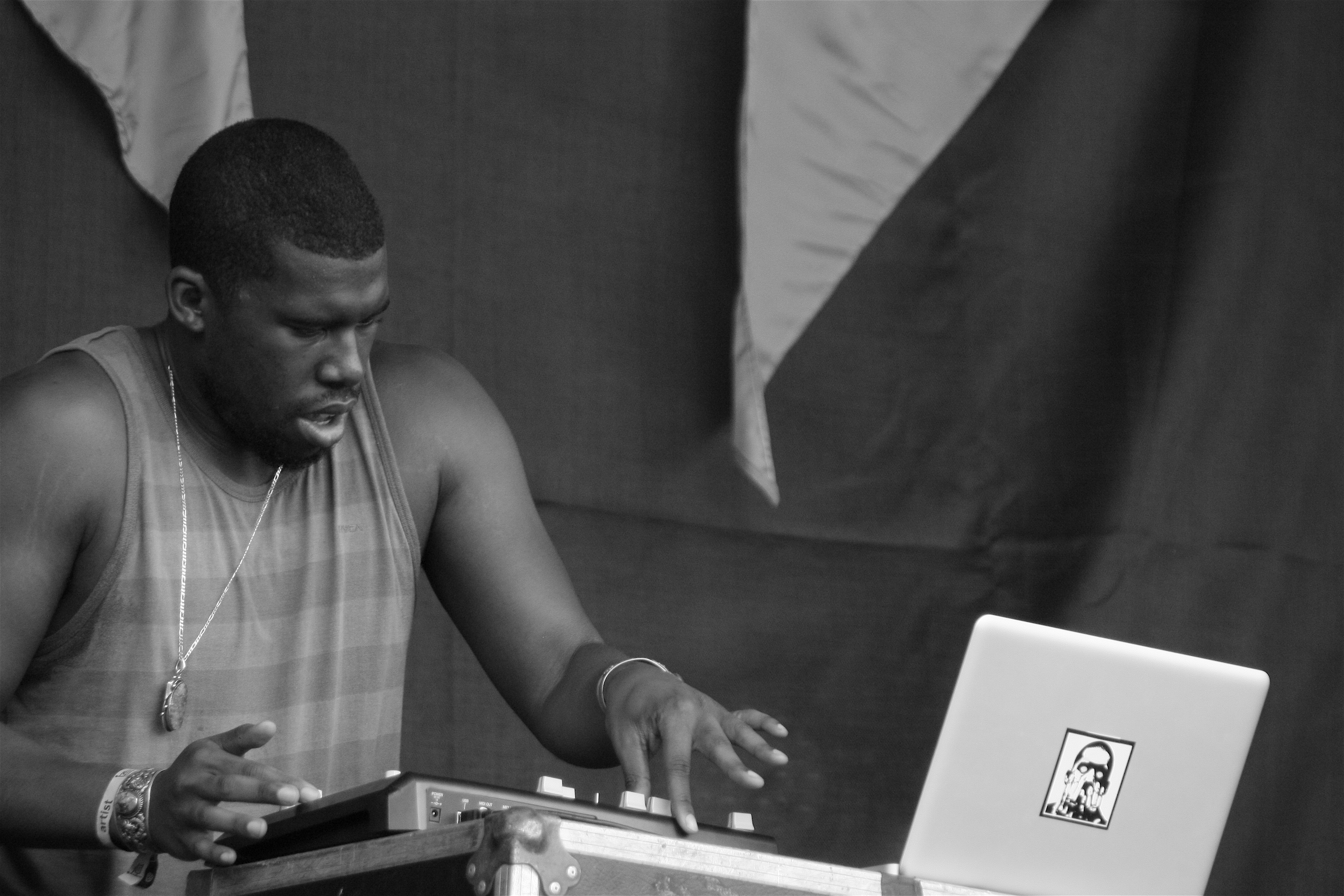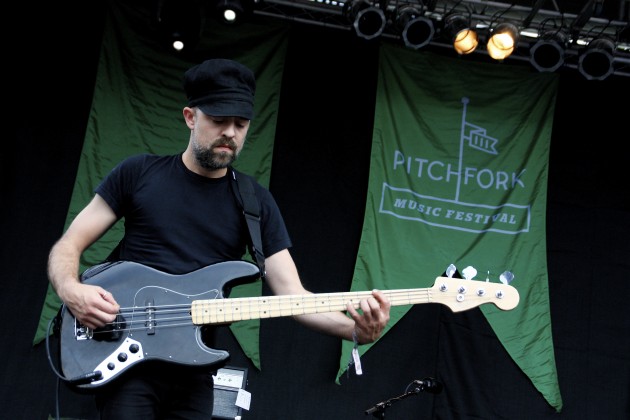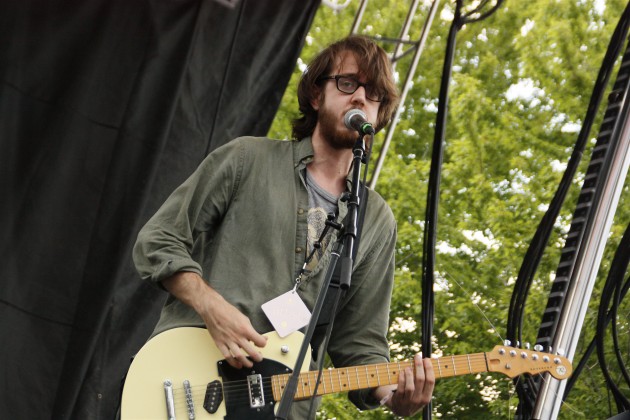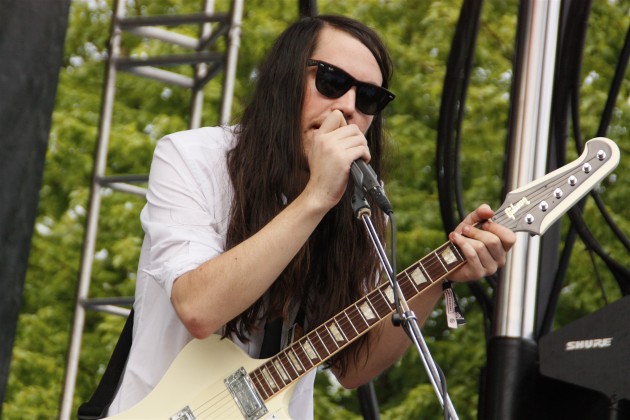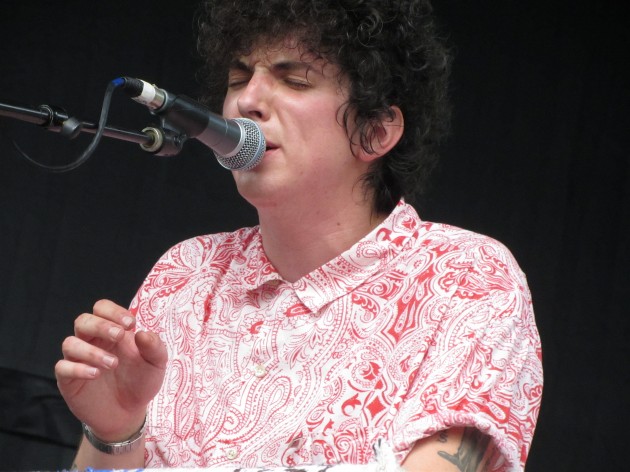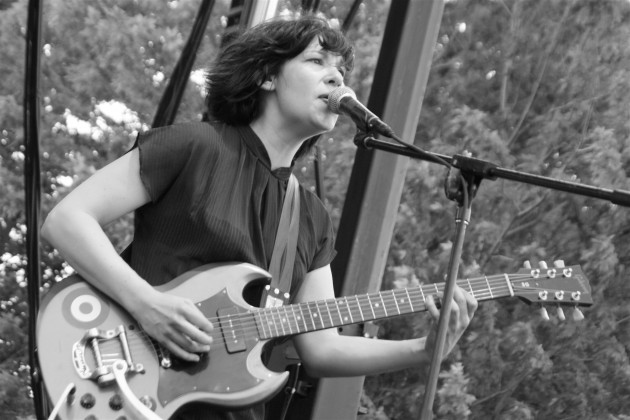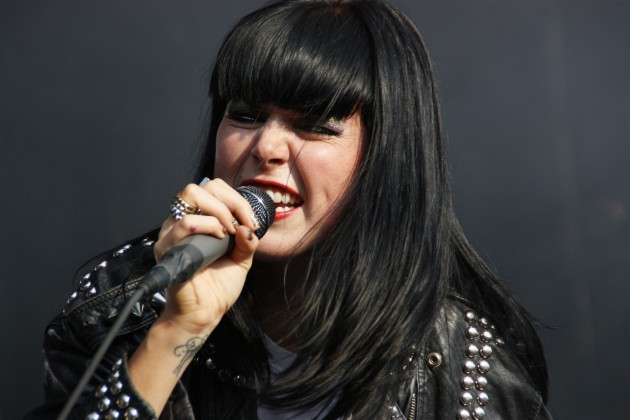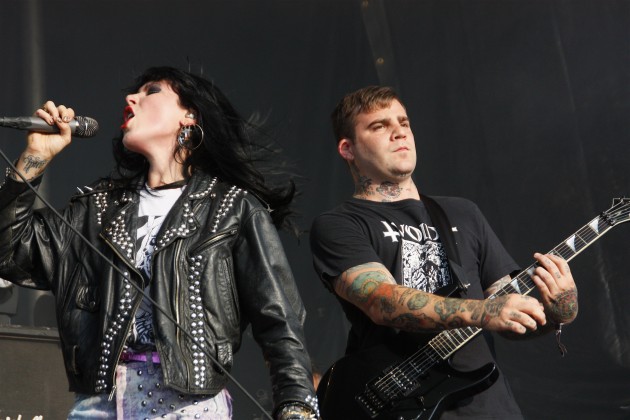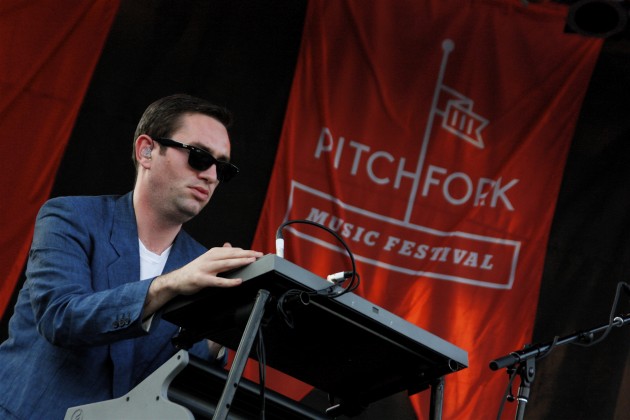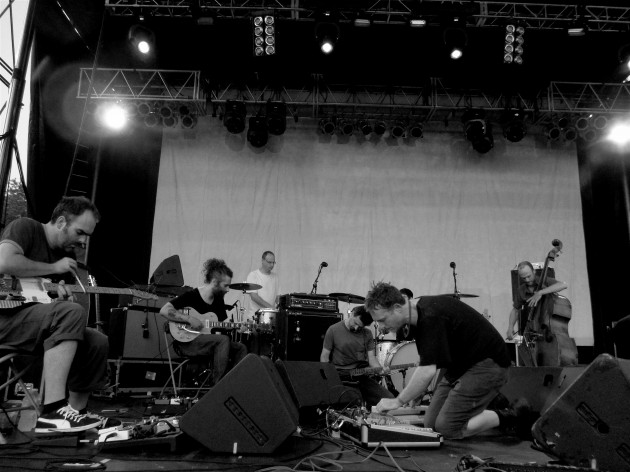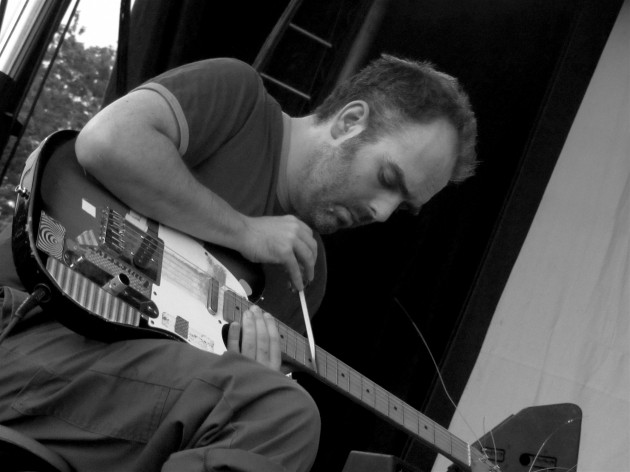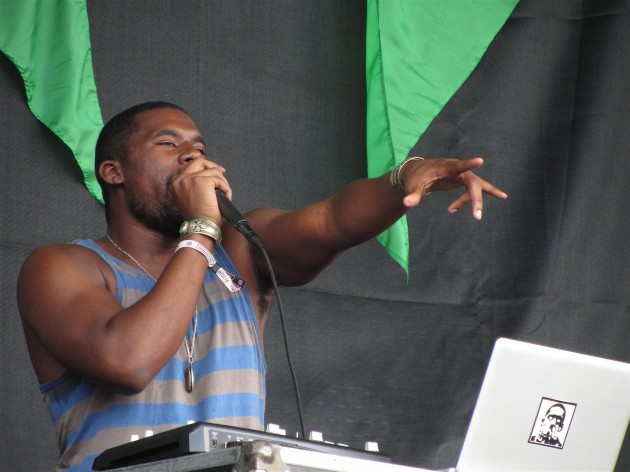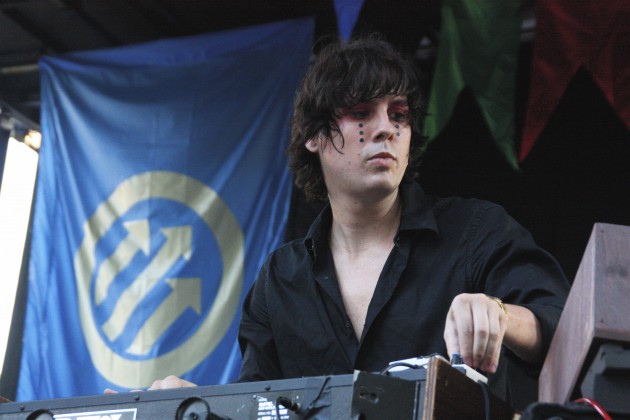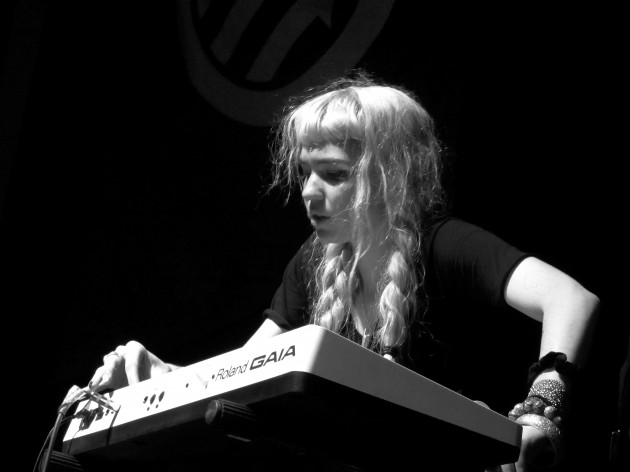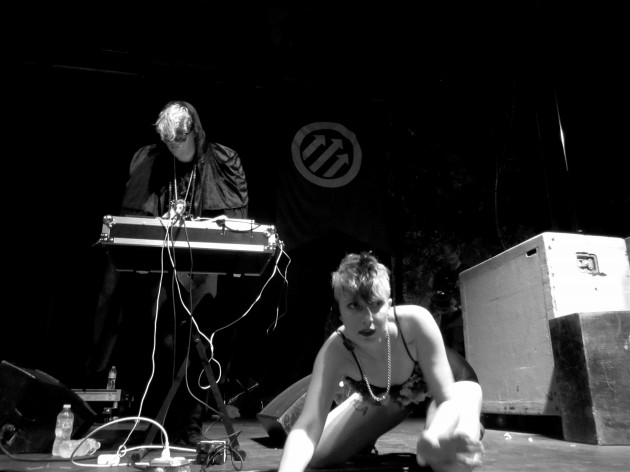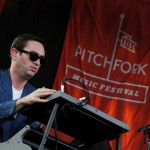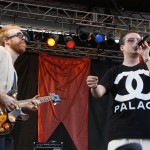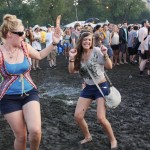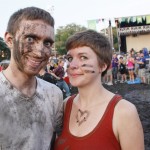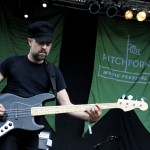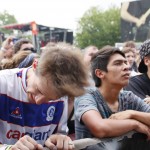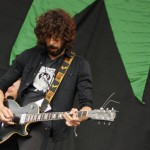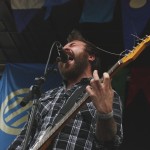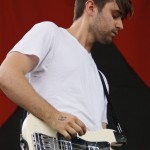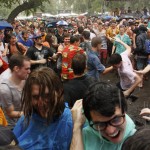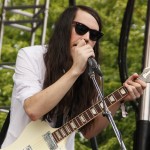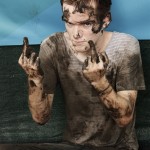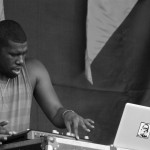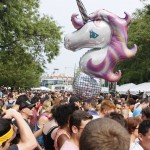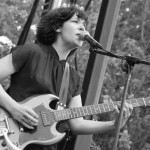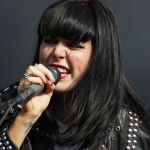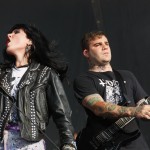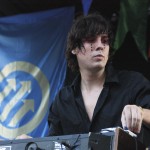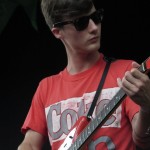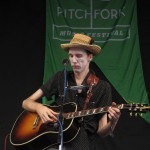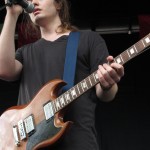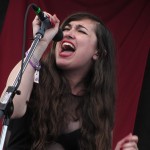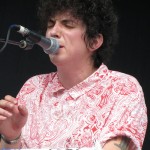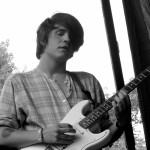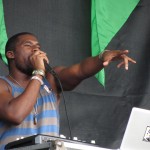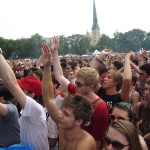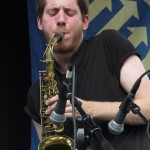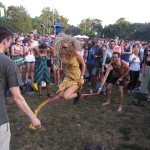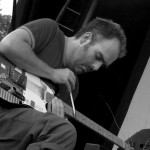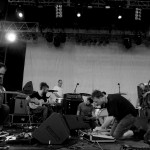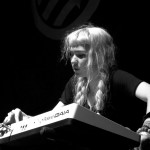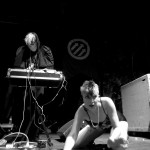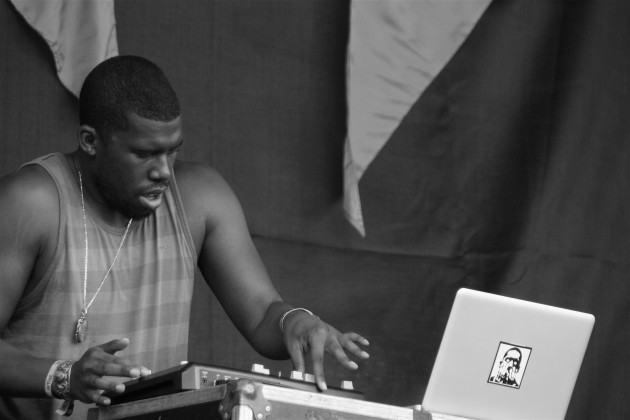
Flying Lotus. All photos by Christopher Alvarez
It’s day two and the weather has only worsened. While Saturday’s crowd is up from Friday’s, there seems to be far less in attendance than Saturday last year. Whether that’s solely due to the rain or other factors is anyone’s guess. Regardless, the park conditions aren’t particularly hospitable – mud pits have formed all over the festival grounds and made for an even more difficult crowd to navigate through – and the ever-gray sky doesn’t make for a particularly stellar backdrop to these performances.
Like yesterday, there are not many big names for most of the day making Saturday too about musical discovery. This is the first full day of the fest, so the lineup is considerably expanded.
The Psychic Paramount
Having an instrumental power trio opening the fest is a bit of a left field choice. Instrumental groups have been successful in finding an audience with Pitchfork (most notably Explosions In The Sky), but there’s usually a pretty low cap to their mass appeal. However, these groups tend to present well live, and such is definitely the case with the Psychic Paramount. The group employs rhythmic guitar revs – not all that dissimilar from the guitar sound of the Edge – to texture the sound while using the drums for color and decoration rather than the other way around. On some of their hardier, noisier numbers, the guitar is put front and center which is where Drew St. Ivany excels. Bassist Ben Armstrong holds everything together with his feverish fretwork. The band stayed mostly in the uptempo department throughout the performance, but within that they found room to explore a variety of musical directions. A nice surprise to say the least.
Cloud Nothings
The set Cloud Nothings gave is likely the closest experience I’ll ever have to Nine Inch Nails’ mud covered performance at Woodstock ’94. Midway through their performance, the rain became so heavy that not even those with ponchos and umbrellas were spared.
The shitty weather juxtaposed against Cloud Nothings’ poppy grunge made for quite a scene. Dylan Baldi’s group played some maddening rock, seemingly attempting to out-fury the rain and forcing the soaked crowd to dance wildly throughout the forming mud pits. Eventually, the PA short circuited and Cloud Nothings had to take a breather. Then, in a move that still wreaks of insanity, the band came back onstage to finish their set to uproarious applause. It was a great “fuck you” to mother nature, and the first great rock ‘n’ roll moment of Pitchfork 2012.
Atlas Sound
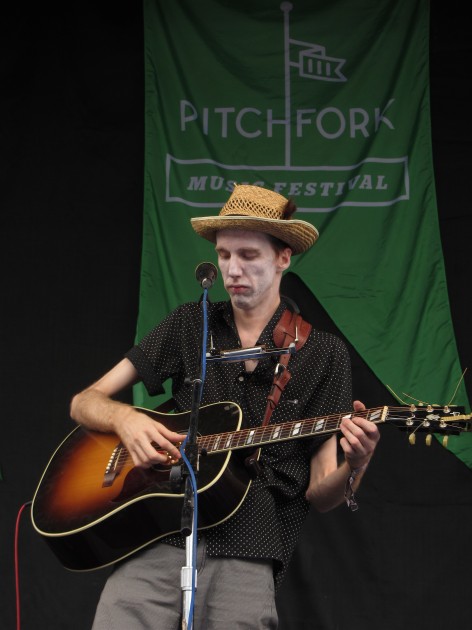
This is Bradford Cox’s second consecutive year at Pitchfork, with last year’s Deerhunter set being one of that festival’s highlights. Atlas Sound, the name for his solo output, is far more intimate and ethereal than Deerhunter. The crowd, still enduring what looked like a monsoon, was very engaged and participatory with Bradford. When you cut out the atmospheric backdrop, Bradford performs much like Bob Dylan used to in his early years (with a face painted in a manner also reminiscent of Dylan on his Rolling Thunder Revue tour). Bradford’s acoustic guitar isn’t heavily manipulated other than some added echo, giving added weight to his vocals. But it’s the aforementioned atmospherics that bring Atlas Sound its uniqueness. “I’m going to play a depressing song,” Bradford proclaims as he shifts into the downtrodden “Amplifiers.” The lonely sound of his acoustic playing reflected the heavy rain coming down around him; it was the high point of the set. Also worth appreciation is his harmonica playing. Again, like Dylan, he uses it to punctuate his songs. It’s a greatly underutilized instrument in modern music, and Bradford is one of its most prominent champions. We’ll miss Bradford, one of the most prolific and likeable musicians of his generation, when he’s gone.
Liturgy
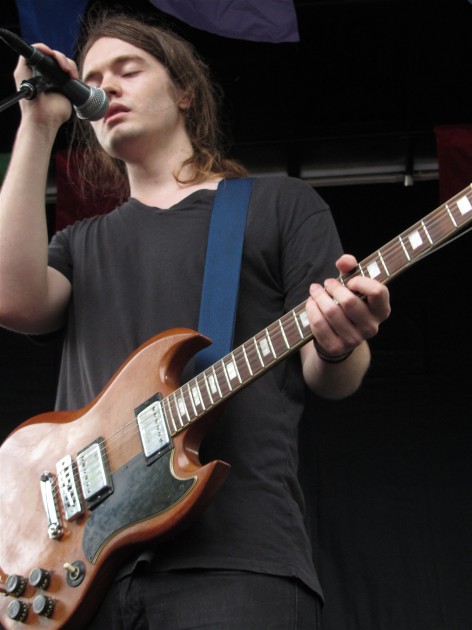
Having a death metal ensemble such as the Brooklyn based Liturgy isn’t wholly unprecedented at Pitchfork. Last year, Kylesa rocked out the blue stage to an overflow crowd, so there’s definitely an audience at Pitchfork for this type of music. Liturgy is even further along the line in the “death” category, though, and crowd maintenance can be an issue when across the way Cults is playing.
Liturgy exhibited a new group composition at Pitchfork. Drummer Greg Fox is out of the group, as is bassist Tyler Dusenbury apparently. With the former replaced by a drum machine, they soldiered through a blistering set that sounded like a car manufacturing facility on a live volcano. The group welcomed the storm, claiming that the “thunderclouds are swirling in preparation for our Pitchfork fest set.” It certainly seemed that way, as Hunt Hendrix growled and howled his way through an Aesthethica heavy set list. It’s always been an easy criticism to compare such vocals to “Cookie Monster,” but that completely undercuts the ferocity of Hunt Hendrix’s voice.
Cults
Vocalist Madeline Follin was covered in clear plastic as Cults first appeared on the stage for their set. As has been the case for virtually the entire weekend so far, the weather was a dominant narrative. Brian Oblivion, in a bit of pandering to the muddied Pitchfork audience, shot two birds at the rain clouds in retaliation. Soon after the clouds dissipated, and the band began a delightfully sunny performance. The chiming “Abducted” opened the show, bringing cheers and lifting up the crowd from the maroon they’d been trapped on till that point. Unfortunately, technical problems popped up again, with Follin’s mic going in and out for large parts of “The Curse” and “Never Heal Myself.” Thankfully, the sound issues were resolved in time for the group’s breakout hit “Go Outside” which proved to be the highlight of the show.
Youth Lagoon
Youth Lagoon is the kind of band that attempts to sound live exactly as it does on album. Limited by synthetic drums, there really isn’t much extra to experience in person. Singer Trevor Powers warbles through while playing his keyboard, and the guitarist shakes slightly but always in one place. At times, such as the delightful “Montana,” the group gets into the zone a little and treads into some Sparklehorse territory. Outside of that, however, there really wasn’t a whole lot to take in here. You can only use the same syncopated dance beat so many times before it loses its impact.
Wild Flag
Just when everything seemed to be spiraling downward, Wild Flag took the red stage and turned everything around. “We wrote our whole record in the rain,” singer Carrie Brownstein claimed. The weather conditions, somewhat improved since the nadir during Atlas Sounds’ performance, didn’t seem to bother Wild Flag. Of course, they’re veterans of virtually any kind of storm whether it be literal or figurative. The group cavorted through a blistering 45 minutes of material from their brilliant debut and a cover of Television’s “See No Evil.” The set will be most remembered for the jam session rendition of “Racehorse” which featured not one, but two blistering solos from Brownstein that was the equal of anything any of the boys played this weekend.
Sleigh Bells
Like any seasoned live reviewer, I came to Pitchfork armed with high fidelity ear plugs to keep my ears from bleeding (really every concert goer should invest in some, they’re great). Yet even while wearing them, Sleigh Bells committed some truly foul acts upon my eardrums. There is no louder act going in music of any genre. No one. That is a plateau Sleigh Bells holds all by its lonesome.
Sleigh Bells has had a tumultuous relationship with Chicago. Their 2010 Pitchfork set saw singer Alexis Krauss lip-sync through much of the performance and last year they outright cancelled their scheduled slot at Lollapalooza in favor of heading into the recording studio. Finally after many years, Sleigh Bells gave the city the sparkling performance it’s been waiting for. Krauss was in fine shouting form as she fought to be heard over the dueling guitars of Derek Miller and touring partner Jason Boyer. Krauss’ presence was magnetic, bouncing and shifting around the stage to the rhythms of the drum machine and embodying the music. The crowd got into it as well, leaving the green stage field in a condition that can only be described as post-battlefield.
Hot Chip
Hot Chip’s performance provided a parallel between this and last year’s festivals. A year ago Cut Copy, a dance band more similar than dissimilar from Hot Chip, occupied the very same stage and time slot. Each band set up their day’s respective headliner up quite well, with Cut Copy’s at ease temperament balancing out TV On The Radio’s more serious tenor.
That said, this wasn’t a case of déjà vu. Cut Copy sauntered through their set, Hot Chip played with a much deeper focus. Such is pretty rare in electro-pop. The group sported very serious faces during “Over And Over,” a song which drew the loudest applause of the set. The show brought the Pitchfork crowd into a dance frenzy, which while looked fun from the outside, could not have been easy on those stuck in the middle. Lots and lots of mud flinging.
Godspeed You! Black Emperor
It’s an unfortunate day when the best showing at Pitchfork is watched by most modest crowd you’ll ever see for a festival headliner. Part of that blame goes to the festival for putting Godspeed You! Black Emperor up against the currently popular Grimes. It certainly didn’t help matters that during some of the softer portions of Godspeed’s set Grimes could be heard all the way from the blue stage.
For those who were in attendance, they were fortunate to witness one of the best instrumental groups going. Godspeed started and concluded their set with 20-minute, slowly built up jams. As there is no video for the crowd to watch, the focus shifts to the stage where violins are intertwined with guitars and drums. A mesmerizing sound pours from the stage to a very appreciative crowd, most of which had the look of Godspeed veterans. While it’s unfortunate that they weren’t given the appreciation only a large audience can provide, there must be something reassuring about having only the diehards in attendance.
Flying Lotus
Nicolas Jaar
Chromatics
Grimes

